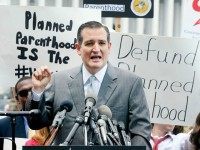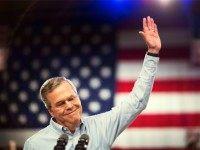If you’re not on stage for the next GOP debate, can your presidential campaign continue to make a sound?
At the third GOP presidential debate next month in Colorado, host network CNBC is suggesting that the criteria for making the main stage debate will be stricter than previous debates — and there will reportedly be no “happy hour” debate at all.
“I don’t believe in setting a set number,” NBC political director Chuck Todd, who is helping set entrance criteria for the debate, recently explained on ESPN radio. “I think maybe you come up with ‘oh are you at 5 percent or more in Iowa or New Hampshire’ you can create a sort of floor, no more 4-percenters get in, no more 3-percenters get in.”
We do not know yet whether that will be the standard. But if the debate was held today, such a standard would eliminate Kentucky Sen. Rand Paul, New Jersey Gov. Chris Christie and former Arkansas Gov. Mike Huckabee, all of whom are polling under 5 percent in both Iowa and New Hampshire, according to the RealClearPolitics averages of those states.
Of course, other presidential contenders like South Carolina Sen. Lindsey Graham, former New York Gov. George Pataki, Louisiana Gov. Bobby Jindal, former Pennsylvania Sen. Rick Santorum and former Virginia Gov. Jim Gilmore are also below the 5 percent mark, but they have never appeared at any of the main stage debates and have long been considered little more than candidates-in-name-only.
The salient question is: can the campaigns of candidates who were once perceived as higher-tier like Paul, Christie and Huckabee survive if they are excluded from October’s debate stage?
None of their campaigns responded to a Daily Caller request for comment on what the path to the nomination would be if their candidates were excluded from the October 28 debate. But failing to make the debate stage would certainly give a candidate the stench of death — with all the negative consequences that go along with it.
“I would think it would have a chilling effect on contributors and lead to an unflattering narrative about the candidates’ prospects,” Stu Rothenberg, founding editor of the The Rothenberg & Gonzales Political Report, explained to The Daily Caller.
In the case of Paul’s campaign, some are already seeing the vultures circling. On Monday, the Hill reported that the Kentucky senator would take a break from his presidential campaign this week to focus on fundraising for his Senate re-election campaign.
“If he thought he’d be the nominee, he wouldn’t spend time hedging his bets and raising money for the Senate race,” a Kentucky political operative told the Hill. “I think that tells you everything you need to know.”






















